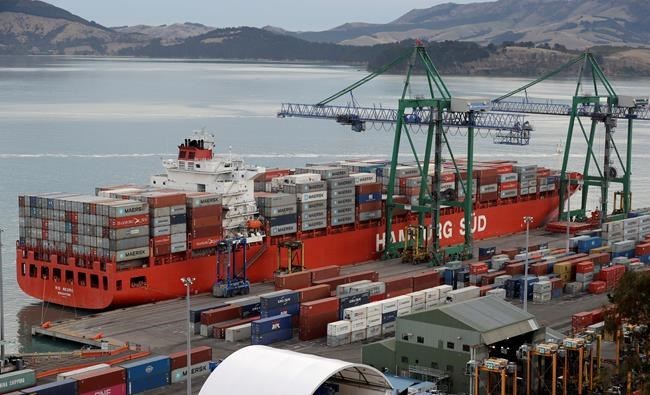
In this June 3, 2020, photo, containers are loaded onto a ship for export at Lyttelton Port near Christchurch, New Zealand. Both Australia and New Zealand announced Wednesday they are starting free-trade talks with the United Kingdom, as each country seeks to rekindle a trading relationship that was severely tested nearly 50 years ago. (AP Photo/Mark Baker)
Republished June 17, 2020 - 12:01 AM
Original Publication Date June 16, 2020 - 11:06 PM
WELLINGTON, New Zealand - Both Australia and New Zealand announced Wednesday they are starting free-trade talks with the United Kingdom, as each country seeks to rekindle a trading relationship that was severely tested nearly 50 years ago.
The U.K. wants to quickly sign multiple trade deals with individual countries after leaving the European Union in January. But some people Down Under still feel a deep sense of betrayal at the way the U.K. suddenly cut back its trade with them when it first joined the European market in 1973.
“There is no doubt Australia was a casualty from the U.K.'s entry into the European Economic Community,” Australian Trade Minister Simon Birmingham told reporters. “In 1973, the U.K. was Australia’s third-largest two-way goods partner. Now it is our 12th. U.K. consumers turned away from Australian produce when high tariffs and low quotas were imposed.”
Likewise, before 1973, New Zealand was often described as “Britain's Farm” because so many of its meat, wool and dairy products were sold to British consumers.
Historians have argued the U.K.'s pullback ultimately benefited Australia and New Zealand by forcing them to broaden their horizons and find new buyers for their goods in the Middle East, North America and Asia.
Laura Clarke, the British High Commissioner to New Zealand, said New Zealand had actually started to diversity its export markets prior to 1973.
“When you look at it now from a current globalized point of view, would it still be sensible to have your main trading partner on the opposite side of the world?” she said. “I think that everyone agrees that diversification in trade is really, really important. My hope is that we can build on what's gone on in the past and actually build something greater going forward."
New Zealand Prime Minister Jacinda Ardern said she, too, was looking to the future.
“No-one can rewrite our history and the sentiment that was felt. It's not for us to change how people felt about that at the time,” she said. “But, I think the high commissioner is correct, our policy in the here-and-now is to strengthen our resilience and our economy through diversification.”
Sticking points in any free-trade deals are likely to revolve around agricultural goods and rules on digital trade, among other issues.
Australia is set to begin formal talks with the U.K. later this month while New Zealand will being its discussions, which will take place virtually because of the coronavirus, on July 13.
Nobody is putting a timeline on when the deals might be completed, although they will likely be finalized only after the U.K. has negotiated its own trade deal with Europe.
___
Associated Press reporter Rod McGuirk in Canberra, Australia, contributed to this report.
News from © The Associated Press, 2020